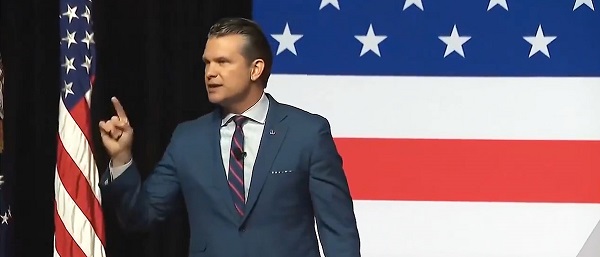Daily Caller
Trump’s Energy Secretary Wasting No Time In Declaring End To Biden’s War On Coal


From the Daily Caller News Foundation
By David Blackmon
It seems safe to predict that Chris Wright is going to be a consistent newsmaker for the duration of his time as the nation’s secretary of Energy. Wright has never shied away from public controversy related to energy and climate policies, and this past week brought a good example.
During an interview with Bloomberg on Wednesday, Wright talked about the “all of the above” energy source philosophy he shares with President Donald Trump, and emphasized that, when he says “all” energy sources, that is exactly what he means. In a direct 180-degree turn from the war on the nation’s domestic coal industry mounted by both Presidents Joe Biden and Barack Obama, Wright told Bloomberg’s hosts the time has come to halt the closing of coal-fired power plants in the United States.
“Coal has been essential to the United States’ energy system for over 100 years,” Wright said. “It’s been the largest source of global electricity for nearly 100 years, and it will be for decades to come, so we need to be realistic about that.”
Wright pointed out that the U.S. under both Biden and Obama was on a path to shrink the coal power generation sector, an action he says has “made electricity more expensive and our grid less stable.” The Trump agenda to reindustrialize the American economy and end the shipping of the country’s heavy industries overseas to China and India depends on a growing abundance of reliable, affordable, 24/7 power generation that can only be provided by natural gas, coal, and less affordably, nuclear.
Admitting that a resurgence in the growth of coal power is unlikely, Wright adds “the best we can hope for in the short term is to stop the closure of coal power plants. No one has won by that action.” This could also include allowing regional grid managers to permit the reactivation of mothballed coal plants, but, at least in the near term, is unlikely to see permits issued for new, greenfield coal plants.
Michelle Bloodworth, president and CEO of America’s Power, told me in an email that “Secretary Wright is correct that affordable, reliable, and secure energy should be the goal, and coal can deliver on all of those fronts. Energy demand is skyrocketing, and shutting down coal plants before replacement sources can be brought online would be a disaster for the American power grid and the economy.”
Pointing to Trump’s executive order declaring a national energy emergency, Bloodworth urged EPA Administrator Lee Zeldin to move to rewrite heavy-handed Biden-era regulations that have led to the premature closing of a large number of coal plants, diminishing grid stability in the process. “We look forward to continuing to work with the Trump Administration to ensure coal can continue to support our country’s growing energy needs for years and years to come,” she added.
Michelle Manook, CEO of the global trade group FutureCoal, points out that the U.S. is home to an unrivaled abundance of coal resources, and that advanced technologies are now capable of removing 99% of real pollutants in modern power plants. “The question for US policymakers and the nation’s value chain, with its still 400 years of reserves, is this: Will you lead the modernization and reindustrialization of this critical resource?” she told me.
For Wright, reindustrialization of the U.S. economy is the key driver of the need for more power generation from every source.
“The goal is just affordable, reliable, secure energy from wherever that comes from,” he told Bloomberg, noting that solar (but, interestingly, not wind) will also have a role in power generation into the future.
“We’re not going to go down the road of Germany,” Wright added. “They spent a half a trillion dollars, they more than doubled their price of electricity, they actually shrunk the total amount of electricity the country produces by about 20% – and their industry is fleeing the country. That’s the path the United States was starting to go down, but that’s the wrong path.”
It’s a new day in American power generation. Coal is in, wind is out and reindustrialization is the goal. Climate alarmists will scream disaster, but for millions of others, it’s all a long-awaited breath of fresh air.
David Blackmon is an energy writer and consultant based in Texas. He spent 40 years in the oil and gas business, where he specialized in public policy and communications.
Daily Caller
Hegseth Planning Huge Shakeup Of Top Military Command: REPORT


From the Daily Caller News Foundation
War Secretary Pete Hegseth is moving forward with a massive shakeup of military leadership, restructuring top commands and moving the U.S. focus away from Europe and the Middle East, according to a report out Monday.
Five sources with knowledge of the matter told The Washington Post the Pentagon is set to consolidate U.S. Central Command in the Middle East, U.S. European Command and U.S. Africa Command into a new larger combatant command, the U.S. International Command. Other commands would be similarly consolidated, reducing the total number of combatant commands from 11 to eight. The intended restructuring is designed both to reduce the number of admirals and four star generals and refocus the U.S. military on the Indo-Pacific and Western Hemisphere, according to the sources.
The plan would be one of the most significant changes to the military’s upper echelons in decades, and the move would bring the Pentagon more directly in line with the administration’s refocusing of priorities in the recently released National Security Strategy.
Dear Readers:
As a nonprofit, we are dependent on the generosity of our readers.
Please consider making a small donation of any amount here.
Thank you!
“As a matter of Department of War policy, we will not comment on leaked documents that we cannot authenticate and rumored internal discussions, as well as specifics of architectural discussion or pre-decisional matters,” a War Department official told the Daily Caller News Foundation. “Beyond this, any insinuation there is a divide within the Department is completely false – everyone in the Department is working to achieve the same goal under this administration.”
The Post also reports the proposal was crafted under supervision by Chairman of the Joint Chiefs of Staff Gen. Dan Caine, at Hegseth’s request. Caine will also be sharing two alternate proposals on potential restructures.
Hegseth has been looking for ways to reduce the number of four star generals in the Armed Forces, which has roughly the same amount of generals now as during World War II.
Daily Caller
Paris Climate Deal Now Decade-Old Disaster


From the Daily Caller News Foundation
By Steve Milloy
The Paris Climate Accord was adopted 10 years ago this week. It’s been a decade of disaster that President Donald Trump is rightly trying again to end.
The stated purpose of the agreement was for countries to voluntarily cut emissions to avoid the average global temperature exceeding the (guessed at) pre-industrial temperature by 3.6°F (2°C) and preferably 2.7°F (1.5°C).
Since December 2015, the world spent an estimated $10 trillion trying to achieve the Paris goals. What has been accomplished? Instead of reducing global emissions, they have increased about 12 percent. While the increase in emissions is actually a good thing for the environment and humanity, spending $10 trillion in a failed effort to cut emissions just underscores the agreement’s waste, fraud and abuse.
As a nonprofit, we are dependent on the generosity of our readers.
Please consider making a small donation of any amount here.
Thank you!
But wasting $10 trillion is only the tip of the iceberg.
The effort to cut emissions was largely based on forcing industrial countries to replace their tried-and-true fossil fuel-based energy systems with not-ready-for-prime-time wind, solar and battery-based systems. This forced transition has driven up energy costs and made energy systems less reliable. The result of that has been economy-crippling deindustrialization in former powerhouses of Germany and Britain.
And it gets worse.
European nations imagined they could reduce their carbon footprint by outsourcing their coal and natural gas needs to Russia. That outsourcing enriched Russia and made the European economy dependent on Russia for energy. That vulnerability, in turn, and a weak President Joe Biden encouraged Vladimir Putin to invade Ukraine.
The result of that has been more than one million killed and wounded, the mass destruction of Ukraine worth more than $500 billion so far and the inestimable cost of global destabilization. Europe will have to spend hundreds of billions more on defense, and U.S. taxpayers have been forced to spend hundreds of billions on arms for Ukraine. Putin has even raised the specter of using nuclear weapons.
President Barack Obama unconstitutionally tried to impose the Paris agreement on the U.S. as an Executive agreement rather than a treaty ratified by the U.S. Senate. Although Trump terminated the Executive agreement during his first administration, President Joe Biden rejoined the agreement soon after taking office, pledging to double Obama’s emissions cuts pledge to 50 percent below 2005 levels by 2030.
Biden’s emissions pledge was an impetus for the 2022 Inflation Reduction Act that allocated $1.2 trillion in spending for what Trump labeled as the Green New Scam. Although Trump’s One Big Beautiful Bill Act reduced that spending by about $500 billion and he is trying to reduce it further through Executive action, much of that money was used in an effort to buy the 2024 election for Democrats. The rest has been and will be used to wreck our electricity grid with dangerous, national security-compromising wind, solar and battery equipment from Communists China.
Then there’s this. At the Paris climate conference in 2015, U.S. Secretary of State John Kerry stated quite clearly that emissions cuts by the U.S. and other industrial countries were meaningless and would accomplish nothing since the developing world’s emissions would be increasing.
Finally, there is the climate realism aspect to all this. After the Paris agreement was signed and despite the increase in emissions, the average global temperature declined during the years from 2016 to 2022, per NOAA data.
The super El Nino experienced during 2023-2024 caused a temporary temperature spike. La Nina conditions have now returned the average global temperature to below the 2015-2016 level, per NASA satellite data. The overarching point is that any “global warming” that occurred over the past 40 years is actually associated with the natural El Nino-La Nina cycle, not emissions.
The Paris agreement has been all pain and no gain. Moreover, there was never any need for the agreement in the first place. A big thanks to President Trump for pulling us out again.
Steve Milloy is a biostatistician and lawyer. He posts on X at @JunkScience.
-

 Alberta7 hours ago
Alberta7 hours agoDanielle Smith slams Skate Canada for stopping events in Alberta over ban on men in women’s sports
-

 Health24 hours ago
Health24 hours agoSaskatchewan woman approved for euthanasia urged to seek medical help in Canada rather than US
-

 Indigenous24 hours ago
Indigenous24 hours agoResidential school burials controversy continues to fuel wave of church arsons, new data suggests
-

 Health1 day ago
Health1 day agoCanadian gov’t considers sharing census data on gender-confused children
-

 International23 hours ago
International23 hours agoFBI didn’t think it had cause to raid Trump but DOJ did it anyway
-

 Crime2 days ago
Crime2 days agoTrump designates fentanyl a ‘weapon of mass destruction’
-

 Energy13 hours ago
Energy13 hours agoLiberals Twisted Themselves Into Pretzels Over Their Own Pipeline MOU
-

 Digital ID2 days ago
Digital ID2 days agoCanada releases new digital ID app for personal documents despite privacy concerns




